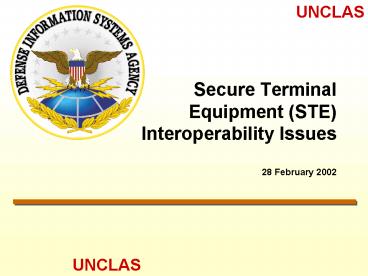Secure Terminal Equipment STE Interoperability Issues 28 February 2002 - PowerPoint PPT Presentation
1 / 17
Title:
Secure Terminal Equipment STE Interoperability Issues 28 February 2002
Description:
Army, Special Ops & USMC cannot call secure to Air Force, JTF, or DSN. 8. UNCLAS. UNCLAS ... Army JCSE, Air Force, or DSN will likely fail (Operation EF! ... – PowerPoint PPT presentation
Number of Views:46
Avg rating:3.0/5.0
Title: Secure Terminal Equipment STE Interoperability Issues 28 February 2002
1
Secure Terminal Equipment (STE) Interoperability
Issues28 February 2002
2
Background
- Purpose of the STE in the JTF network
- Next generation voice and data terminal
- Provides enhanced secure/non-secure digital
communications for joint operations - Supports secure voice, data, facsimile, and VTC
over DISN and tactical networks
3
Findings
- STE does not interoperate in a JTF network
- Does not reliably complete secure calls
- No process in place to ensure testing of the STE
releases prior to fielding - Units are being fielded STE without proper
testing in a combat network with real world
systems/equipment
4
Findings
- Secure Voice
- Does not reliably complete secure calls when used
in a mixed tactical/PBX/strategic network - Latest release performs WORSE (0 in some
scenarios) than previous release - Test results corroborated by deployed units in
Enduring Freedom (CENTCOM, SOCOM) - Data / VTC / Facsimile
- Dependent on the secure voice call completing
5
Test Network STE 1cDICE 2001 (JTF Notional
Network)
- Requested by Army Staff
- Focused on legacy MSE/TRI-TAC, ULCS, and
strategic switches - Extensive testing to verify fixes of earlier 1b
version
6
Test Network STE 2.0 ENDURING FREEDOM - Real
World Problem
Promina / Satellite Network
Promina / Satellite Network
DSN SL-100
Army TRI-TAC TTC-39D
SOCOM TRI-TAC TTC-39E
- Requested by CENTCOM/SOCOM
- Replicated Enduring Freedom network
- Narrower focus than previous 1C testing
Air Force TDC-ICAP PBX
Air Force TDC-ICAP PBX
7
Test Summary Slide
- Secure Call Testing Ver 1c Ver 2.0
- Strategic-Strategic 100 Not Tested
- Tactical-Tactical (16K ECB) 100 Not Tested
- Tactical-Tactical (32K EAC) 70-100 100
- Mixed Network 57-100 0
- Tactical-Strategic/PBX 32-58 0
- 100 if both parties use 4-wire mode
- Root of problem is 4-wireltgt2-wire conversion
- Precludes Tactical ltgt Strategic/PBX/Commercial
calls - Impact
- Army, Special Ops USMC cannot call secure to
Air Force, JTF, or DSN
8
Discussion
- Initial poor performance of STE 1c, no
improvements with STE 2.0 - Worse performance than STE 1c in tactical
networks - Proposed solution not comprehensive
- LTU with Interworking Function
- Does not support USMC, and only 20 of Army
switches
9
Conclusion
- STE will not currently support the requirement
for secure voice communications in a JTF - Deployed units are dependent upon STE
- Any solution must support the joint community
- Interoperability testing with a robust network a
must!
10
Recommendations
- Interim solutions should be tested early and
frequently throughout development - Vendor / PM should take advantage of JITCs
assets to test in realistic environment - All DSN switches
- Service Switches (MSE/TRI-TAC, ULCS, Redcom)
- Satellite, Promina, and other transmission media
11
Backup slides
12
Completion Percentages Strategic ltgt Strategic
Secure Voice
- No significant problems identified in pure
strategic use
13
Completion Percentages Tactical (16K) ltgt
Tactical (16K)
Results from DICE 01
Secure Voice
- No significant problems identified in pure
tactical use - Irrelevant to most Army users they use a red
switch network
14
Completion Percentages Tactical (32K) ltgt
Tactical (32K)
Results from DICE 01
Secure Voice
- Legacy/tactical calls (4-wire TriTac mode) will
usually complete - Predominately Army, USMC
15
Completion Percentages Tactical (16K) ltgt
Tactical (32K)
Results from DICE 01
Secure Voice
- The more realistic the tactical network, the
worse the performance
16
Completion Percentages Strategic/PBX ltT1 / E1gt
Tactical
Results from DICE 01
Secure Voice
- Problem with 2-wire ltgt 4-wire conversion
- Army ltgt JCSE, Air Force, or DSN will likely fail
(Operation EF!!) - Latest STE release is much lower (0-20)
17
STE 2.0 Completion Percentages
Results from EF Hotline Calls
Secure Voice
- In short, STE will not perform in a diverse
(real-world) network































